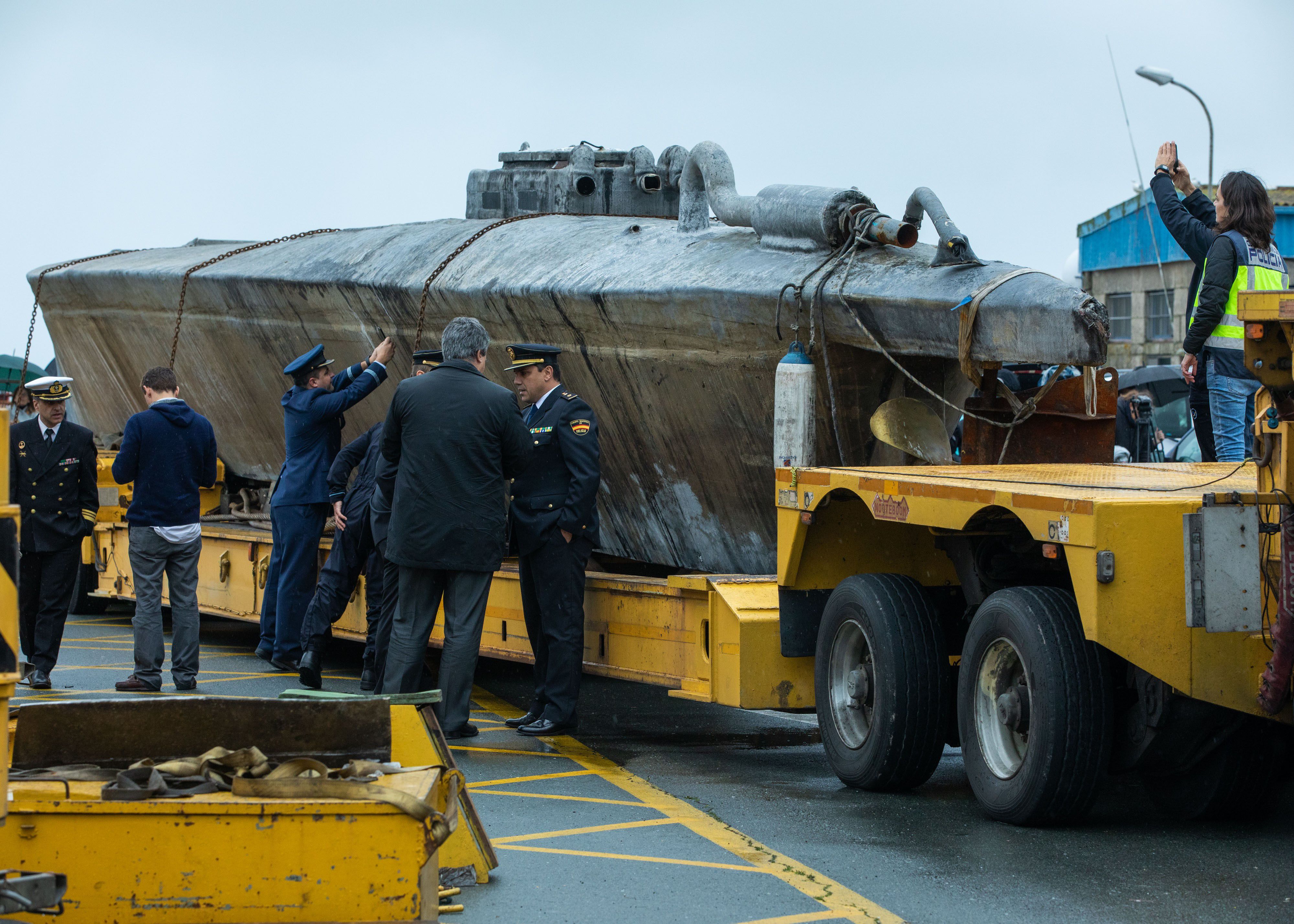How ‘narco-submarine’ carrying £85m cocaine was captured off Spain
One crew member still on the loose after craft intercepted off the coast of Galicia


A free daily email with the biggest news stories of the day – and the best features from TheWeek.com
You are now subscribed
Your newsletter sign-up was successful
A 22-metre trans-Atlantic submarine carrying £85m of cocaine was intercepted by police off the coast of Spain earlier this week, giving a glimpse of the scale and sophistication of the global drugs trade.
On Wednesday, the UK’s National Crime Agency (NCA) said that the chances were a large portion of the cargo was destined for the streets of Britain.
The craft - dubbed the “narco-submarine” in the press - was reportedly travelling from Colombia and carrying 3,000kg - roughly three tonnes - of high-quality cocaine.
The Week
Escape your echo chamber. Get the facts behind the news, plus analysis from multiple perspectives.

Sign up for The Week's Free Newsletters
From our morning news briefing to a weekly Good News Newsletter, get the best of The Week delivered directly to your inbox.
From our morning news briefing to a weekly Good News Newsletter, get the best of The Week delivered directly to your inbox.
How was it discovered?
The EU’s Maritime Analysis and Operation Centre tipped off Spainish authorities that a semi-submersible carrying cocaine was crossing the Atlantic, prompting a coordinated air-and-sea search.
It was floated to the surface off the coast of Galicia, north-west Spain, on Monday night and two Ecuadorian crew members were arrested attempting to swim ashore in bad weather. A third, a Spanish national, remains on the loose after managing to elude the joint forces of the Spanish National Police, Civil Guard and Coast Guard. Police forces from the UK, Portugal, the US and Brazil were also involved.
The crew had apparently been travelling for more than 20 days, and had spent another seven waiting off Galicia’s coast in worsening weather for their cargo to be picked up. “Conditions at sea meant that the [craft] wasn’t able to deliver the drugs to a second vessel,” said a statement by the Guardia Civil.
A free daily email with the biggest news stories of the day – and the best features from TheWeek.com
“Its crew members then headed towards the coast, where they scuttled and abandoned the vessel. The manoeuvre was detected by a Guardia Civil patrol using night-vision goggles, who then noted the boat’s arrival point and the subsequent fleeing of its crew.”
Dozens of officials were reportedly waiting ashore, hoping to witness the transfer of the cocaine to a pick-up boat.
The length of the journey means the craft would have had to have been refuelled as it crossed the ocean. As such, police are now expanding their investigation to potential accomplices.
Where did the submarine come from?
“Investigators believe the 22-metre submarine was built in a clandestine shipyard in South America, probably in Suriname or Guyana,” El Pais reports. The craft is estimated to have cost £2.5 million to build, a sum that underlines the resources, expertise, and rewards available to trafficking gangs.
–––––––––––––––––––––––––––––––For a round-up of the most important stories from around the world - and a concise, refreshing and balanced take on the week’s news agenda - try The Week magazine. Get your first six issues free–––––––––––––––––––––––––––––––
There have long been suspicions that gangs use submarines to evade detection transporting cocaine to Europe.
“Some of those arrested at one time or another said in some police investigation that, yes, the drug arrived in submarines, but so far there was no evidence,” Marta Fontan, a journalist at Faro de Vigo, told Euronews. “It is the first time that it is known that a submarine that leaves South America loaded with cocaine arrives here.”
The Guardian adds that “Galicia’s rias, or inlets, have long been a smuggler’s paradise, but in recent years local drug clans have used them as the main European entry point of Colombian cocaine.”
William Gritten is a London-born, New York-based strategist and writer focusing on politics and international affairs.
-
 The environmental cost of GLP-1s
The environmental cost of GLP-1sThe explainer Producing the drugs is a dirty process
-
 Greenland’s capital becomes ground zero for the country’s diplomatic straits
Greenland’s capital becomes ground zero for the country’s diplomatic straitsIN THE SPOTLIGHT A flurry of new consular activity in Nuuk shows how important Greenland has become to Europeans’ anxiety about American imperialism
-
 ‘This is something that happens all too often’
‘This is something that happens all too often’Instant Opinion Opinion, comment and editorials of the day
-
 Epstein files topple law CEO, roil UK government
Epstein files topple law CEO, roil UK governmentSpeed Read Peter Mandelson, Britain’s former ambassador to the US, is caught up in the scandal
-
 Iran and US prepare to meet after skirmishes
Iran and US prepare to meet after skirmishesSpeed Read The incident comes amid heightened tensions in the Middle East
-
 Israel retrieves final hostage’s body from Gaza
Israel retrieves final hostage’s body from GazaSpeed Read The 24-year-old police officer was killed during the initial Hamas attack
-
 China’s Xi targets top general in growing purge
China’s Xi targets top general in growing purgeSpeed Read Zhang Youxia is being investigated over ‘grave violations’ of the law
-
 Panama and Canada are negotiating over a crucial copper mine
Panama and Canada are negotiating over a crucial copper mineIn the Spotlight Panama is set to make a final decision on the mine this summer
-
 Why Greenland’s natural resources are nearly impossible to mine
Why Greenland’s natural resources are nearly impossible to mineThe Explainer The country’s natural landscape makes the task extremely difficult
-
 Iran cuts internet as protests escalate
Iran cuts internet as protests escalateSpeed Reada Government buildings across the country have been set on fire
-
 US nabs ‘shadow’ tanker claimed by Russia
US nabs ‘shadow’ tanker claimed by RussiaSpeed Read The ship was one of two vessels seized by the US military
